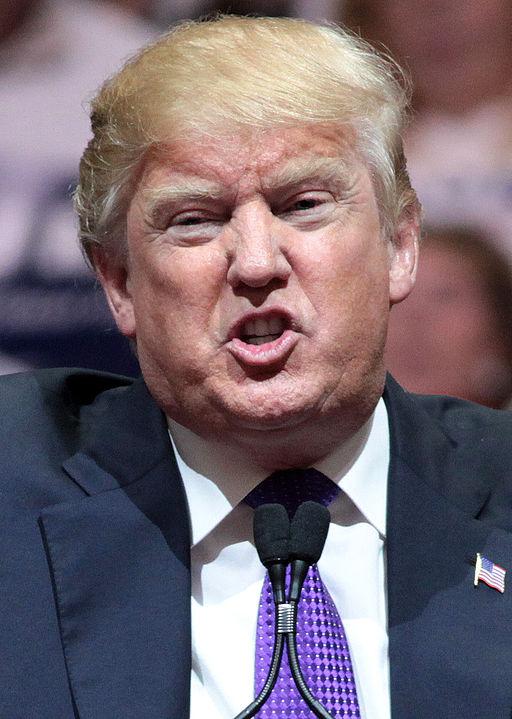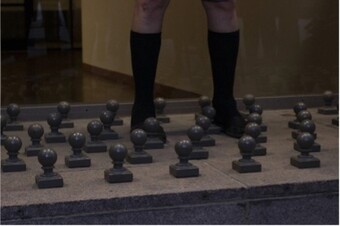Making Theatre in the Season of Trump
There is a distinct possibility that in less than ten months Donald J. Trump will place his left hand on a Bible, raise his right hand, and take the President’s oath of office. Even as someone who deplores today’s hyperbolic discourse, I believe no characterization of such a catastrophe would be too overblown. I am constantly preoccupied by thoughts of what it would mean for myself, my family, my country, and my planet if the American people were to elect a white supremacist autocrat. Apocalyptic visions distract me throughout the day, and I fear that I will soon reach the point where images of Trump in the Oval Office occupy at least 75 percent of my brain space.
For the well-being of our country, we need a collective conversation about why Trump and why now, and if theatres remain absent from that conversation, then they are abdicating their civic responsibility and further consigning themselves to irrelevance.
Sometimes, though, my mind drifts from the future of the human race to the little corner of the world occupied by the American theatre, and I find myself wondering: What will companies’ 2016-17 seasons look like if our country is being governed by a megalomaniac? In such a socio-political context, can a production of Noises Off or Proof be anything other than a shameful exercise in denial? What works would even matter during The Donald’s reign? Do they exist in our current canon, or do we need exclusively new works to address this new reality? How many artistic directors even mentioned Trump when they huddled with their staff to plan next year’s offerings?
A quick perusal of upcoming seasons across the country reveals that too many theatres are operating as if next year will be business as usual. But if we take anything away from this election cycle, it should be that it is not business as usual in the United States. Even if Trump ultimately loses at the ballot box, his meteoric rise as well as the persistent allure of his hateful ideology demonstrate that the nation is in the midst of a crisis. For the well-being of our country, we need a collective conversation about why Trump and why now, and if theatres remain absent from that conversation, then they are abdicating their civic responsibility and further consigning themselves to irrelevance.

Personally, I am less troubled by Trump than I am by those who support him. Trump is an all-too-common figure in history. He is a narcissist who preys upon people’s vulnerabilities to augment his own power, and like all democratically-supported despots, Trump is a manifestation of the popular will. Thus, the only effective response to Trump is to engage his supporters.
I am certain that this Agent Orange would be soundly defeated if the 2016 election were conducted strictly in theatres. On certain nights and in certain buildings, there might not even be a single audience member who would cast a ballot for Trump. There is something virtuous about this, for it demonstrates our institutions’ commitment to decency, tolerance, and critical thinking. However, there is also something disquieting about this fact. It shows how limited our reach is, how homogenous our audiences are. This becomes especially apparent when one considers the absence of individuals from low-income rural and decaying industrial communities (i.e. Trump Country). Looking beyond their xenophobic rhetoric, the subtext one hears from Trump’s supporters is this: “Trump spoke on our behalf at a time when no one else would.” But would Trump’s devotees feel this way and would they have gravitated toward a lupine billionaire cloaked in populist garb if other individuals and institutions had given voice to their concerns first? By no means am I suggesting that theatres should become a mouthpiece for the views held by Trump’s most odious supporters, but I do wonder if the Trump phenomenon would have come into being if politicians, artists, and activists had made an effort to engage members of these communities sooner.
Theatres must now ask themselves: What would such an engagement look like? What barriers of entry would need to be dismantled to reach these communities, and what plays would make these individuals feel empowered instead of angry and resentful? If theatres are committed to fostering positive social change, then answering such questions should become a core part of their mission and programming.
Today’s theatre offers nothing comparable to the emotional release facilitated by comedians such as Larry Wilmore, John Oliver, and Samantha Bee. In large part, this is a function of our tortuous development process, which all but ensures a play is speaking in the past tense by the time it receives its first production.
There is also a second—albeit less inclusive—approach that theatres could adopt towards the Trump phenomenon, for the truth is that dialogue, while essential, is not always possible. In such instances, theatres might look to provide a different service: an emotional catharsis for their patrons who are disturbed by current events. Comedians frequently refer to Trump as a gift from the Comedy Gods, yet I have not encountered a single theatre practitioner who has voiced a similar sentiment about Trump and the Theatre Gods. This fact is telling, for it shows the difficulties theatre faces when it tries to speak in the present tense. Today’s theatre offers nothing comparable to the emotional release facilitated by comedians such as Larry Wilmore, John Oliver, and Samantha Bee. In large part, this is a function of our tortuous development process, which all but ensures a play is speaking in the past tense by the time it receives its first production. What if, instead of announcing a season of preexisting texts, more theatres agreed to commission and produce plays written only during that calendar year? How exciting to open a season brochure and see a theatre declare: “We are producing an entire season of new plays. None of these plays even has a title, but they will all be a reaction to this political moment.” Such a bold statement is the kind of response that this inflection point demands.
Trump’s campaign represents something undeniably awful for the nation, but it also represents an opportunity. This opportunity exists for theatres as well. We need to view Trump’s troubling rise as a call to action, as a sign that things should be done differently. This will mean rethinking what our stories are about, who we tell them to, and how we develop them. Such a reimagining will not only make our theatre more vital, it may just help to keep America great.











Comments
The article is just the start of the conversation—we want to know what you think about this subject, too! HowlRound is a space for knowledge-sharing, and we welcome spirited, thoughtful, and on-topic dialogue. Find our full comments policy here
I have some suggestions. Fairly radical.
A) We need stop demonizing white men.
Hear me out. We need to end the blatant hostility of the Left. We need to stop blasting people for their race, gender, and even their privilege. Enough. It has cost us everything.
I don't like it either, but I'll have to adjust. I repeat: We need to stop judging people based on any real or imaginary privilege. It doesn't work.
Again: Calling people racist, sexist, cisnormative...it doesn't change minds. You know what does? Talking to them. Literally.
http://archive.is/hHzci
Which leads me to...
B) Talk to the people who voted for Trump. You all have family or friends who did. Talk to them and write about them. Try to understand them. Write it.
In summation, stop shutting down the opposition. Judge people on their actions. If they act racist or sexist, talk to them. Within reason.
Right now, right fucking now...give up on privilege. Stop judging people based on what they are. Base it on who they are.
Or are we going to double down on a losing strategy?
Our call.
JJ, you're absolutely right about the importance of talking to people. Written letters, phone calls, face-to-face -- for as long as it takes.
But this is not the time to stop calling racism by its name. I"m not sure why you see the elevation of a proud sexual predator to the highest office in the land as indication that white men have been too "demonized." In the months leading up to the election, the media published story after story speaking to the plight of rural white Trump voters. If the left ignored anything, it wasn't their reasons for choosing Trump -- it was their willingness to ignore the white supremacy at the root of his campaign.
White supremacy is real. Systemic injustice is real. Racism and privilege are real. The suggestion that we stop speaking this truth is not radical, it serves the interests of power. And it is not a way to be a good ally to the communities who will suffer most in the days to come.
Talk, yes. Listen, yes. But don't calling something "racist" isn't tantamount to name-calling and bigotry. It's the truth. It may make our friends and families uncomfortable. But all of us who have come to recognize the reality of white supremacy, heteronormativity, misogyny and class privilege, as well as the ways in which our own lives intersect with these systems, have experienced discomfort and grown from it.
Do not diminish the needs of the most vulnerable to appease the most powerful.
I'm not suggesting that we diminish the needs of the most vulnerable. I'm suggesting a change in tactics. I'm not denying the racism at the root of the Trump phenomenon, especially in light of his terrifying cabinet picks. But I think it is disingenuous to say that white men have not been demonized. This blog alone has published so many pieces about whiteness and male privilege and I'm suggesting that this simply doesn't work as a means to change.
I'm saying we should return to combatting bigotry on an individual basis. I know it requires a lot of us, but we need to stop judging people based on gender, race, sexuality and now privilege. It doesn't work.
An interesting read: https://archive.fo/aLoYJ
Ah. I read the piece, and Marcus rejects the premise of systemic racism. (He also suggests the idea is a new trend, rather than something black scholars and writers have been arguing for ages.)
I don't see any way out of this without frank discussions of systemic racism.
As for what "works," every stride minority groups have made in this country has come from challenging systems of power. Slavery and Jim Crow and mass incarceration are all systems, and for the people hurt by them, separating those institutional forms of oppression into individual acts of bigotry is impossible. Michael Richards losing some standup gigs isn't really the victory we're going for.
If the play is like Sarah Kane's "Blasted" without a didactic bonk-you-over-the-head message you should be ok. Stop with the plays that are "directly" about issues.
Could you elaborate on that Joshua? I'm not sure I follow your idea. Is it that open-to-interpretation plays are more effective that plays that directly reference and deal with specific issues?
Actually, yes. I think specific issue plays tend to overly simplify. I just want the BIG drama...Beckett, Artaud, Berkoff, O'Neill, Kane, Barker...these plays are timeless, their depictions of human pain applicable to our time, even O'Neill. I find most American plays, esp the political plays, poetically impaired, dumbed down, etc.
It's all well and good to reach for old plays, but why not work with the numerous brand new plays out there that are writing directly to what is going on right here right now? Gordon Dahlquist's "Tea Party" was finished back in 2012, I think, and becomes more terrifyingly relevant by the week, yet as far as I know no one has premiered it yet. Anne Washburn's "Mr. Burn"s is relevant. David Finnigan and Reuben Ingall's "Kill Climate Deniers" is relevant. I'm sure there are numerous more. Who's going to help me get "Tea Party" produced right now? I'm not kidding. I'm in the SF Bay Area. Look me up.
I've been thinking particularly about the whole "past tense" issue you bring up, because otherwise the answer seems to be to sift through Arthur Miller, Michael Frayn, and Co. until you manage to find something that might be of use.
That led me to think about a "convivial" theatre, or a theatre that is designed to be open not only to all comers as audience, but to all comers in terms of expression. Something along the theatrical equivalent of community canning kitchens, where the tools are kept for anyone's use. I wonder if this might help to open the field and thus give vent to underserved communities.
I certainly agree, Marshall, that this "Season of Trump" has been frightening and disheartening. Among the most disturbing revelations of the last several months is the appalling level of misogyny he has brought forth--from himself, his followers and from those who purport to be simply commenting from the sidelines. But I don't think theater is as impotent as you suggest when it comes to fighting the ideology and misogyny that Trump spews."The Crucible," for instance, just opened on Broadway, and if ever there was a play that feels apt for the Season of Trump, that's it. And Jesse Oxfeld's review for The Forward draws just the kind of connection for which you are yearning. From the Scottish play to Brecht's "Arturo Ui" to Sarah Daniels' "Masterpieces" or Emily Mann's "Greensboro: A Requiem"--there are plenty of plays out there that dramatize the potential dangers of political power and sexist power, and I suspect that more and more theaters will be including those and others in the coming seasons.